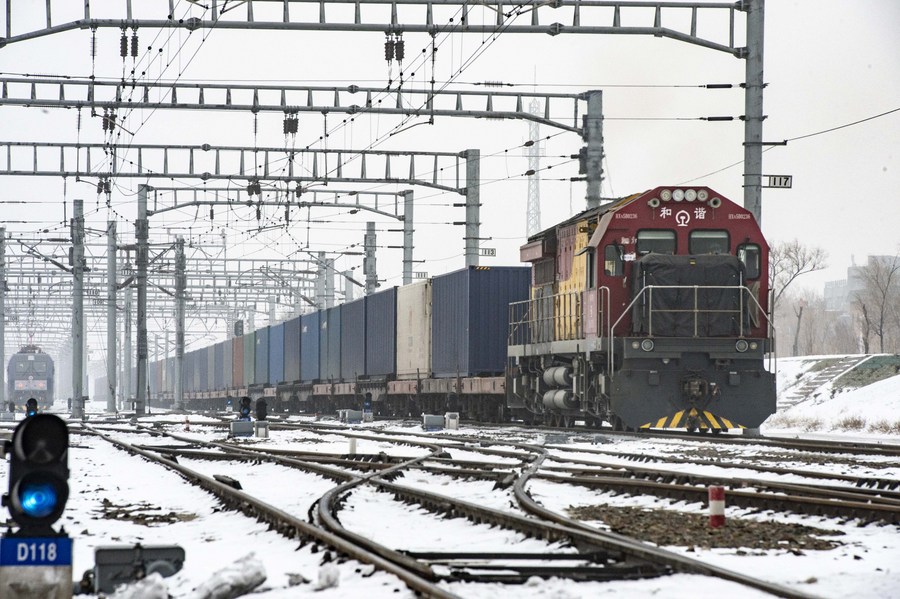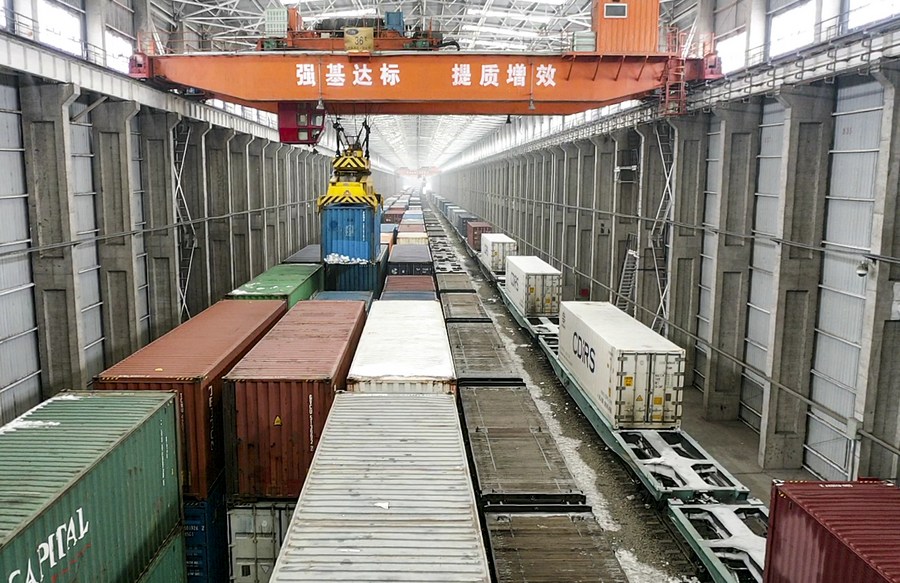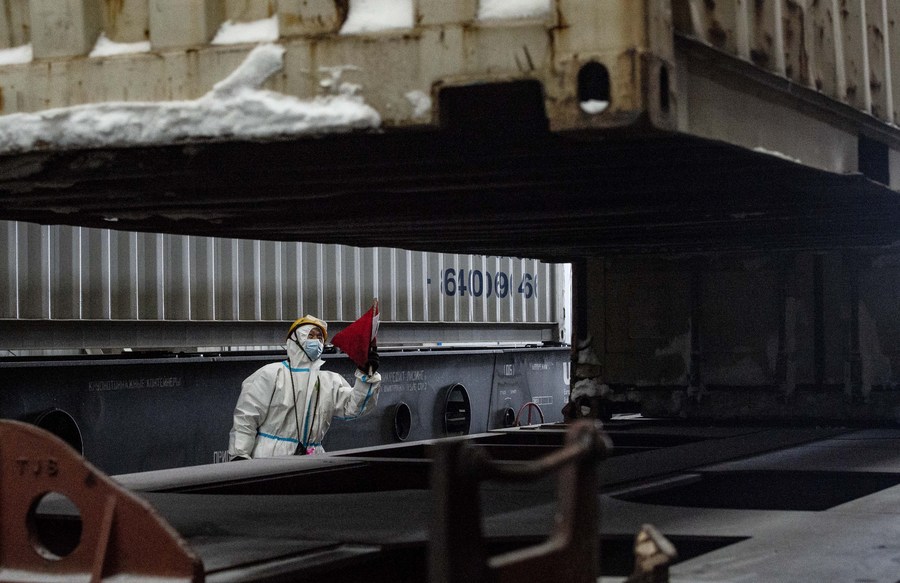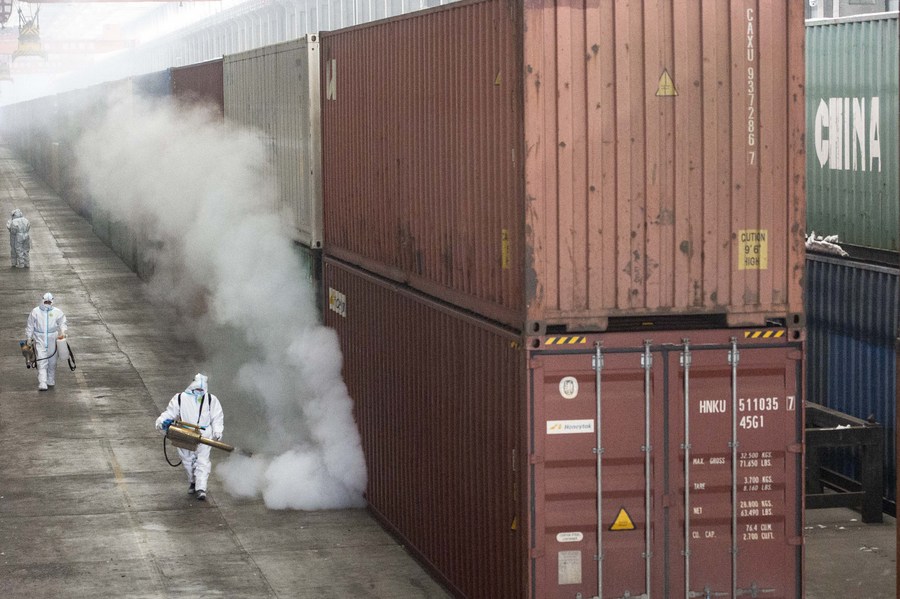by Xinhua writers Zhang Zhongkai, Sun Shaoxiong, Ma Kai and Gao Zun
URUMQI, Feb. 11 (Xinhua) -- As the train whistle blows, Zhang Zhihu watches a freight train with a red and yellow locomotive set into motion.
It is a daily routine for the veteran railway maintenance worker at Alataw Pass, a busy rail port in northwest China's Xinjiang Uygur Autonomous Region.

A China-Europe freight train pulls out of Alataw Pass in northwest China's Xinjiang Uygur Autonomous Region, Feb. 7, 2021. (Xinhua/Ma Kai)
Loaded with goods from China's manufacturing hubs and bound for Malaszewicze in Poland, the train is known as a China-Europe freight train. It is expected to arrive in the transportation hub linking Central Asia and Europe about 10 days after its departure, at which time it will be the start of the Year of the Ox, the second sign in the Chinese zodiac cycle.
"For us, the new lunar year is likely to live up to its bullish and busy implications," said Zhang.
Zhang's optimism is not ungrounded. Largely unaffected by the COVID-19 pandemic, the port has witnessed a year of galloping growth in China-Europe freight trains, a rail connectivity project initiated by China to boost exchanges with European countries.

A container is hoisted in Alataw Pass, northwest China's Xinjiang Uygur Autonomous Region, Feb. 7, 2021. (Xinhua/Ma Kai)
Alataw Pass, which borders Kazakhstan, bested other railway ports in 2020 with a total of 5,027 freight trains passing through, surging 41.8 percent over 2019. The total cargo volume soared nearly 65 percent year on year and the trade value climbed roughly 40 percent.
There are now about 14 freight trains passing through the port every day. The booming freight train service has lent steam to the port's cross-border e-commerce business, which kicked off on Jan. 21, 2020.

A staff member directs operation of containers in Alataw Pass, northwest China's Xinjiang Uygur Autonomous Region, Feb. 7, 2021. (Xinhua/Ma Kai)
The port has seen over 40 million parcels delivered across the border in one year, rising to become the largest cross-border e-commerce portal in northwest China.
The most popular cross-border e-commerce goods include toys, apparel and shoes, and the most enthusiastic online shoppers are from France, Germany and the U.K., according to the Alashankou Comprehensive Bonded Zone Golden Harbour Development Co., Ltd., the cross-border e-commerce service's platform operator.

A staff member checks a China-Europe freight train in Alataw Pass, northwest China's Xinjiang Uygur Autonomous Region, Feb. 7, 2021. (Xinhua/Ma Kai)
Many ordered goods are transported to Alataw Pass by road from warehouses inland before being transferred to the freight train. The combination of road and train transportation costs much less than air freight and saves time compared to shipping.
To hasten delivery, railway workers make full use of all freight trains to load parcels efficiently, and customs officials offer around-the-clock services to cut clearing times.

Staff members perform random sample check on products loaded by China-Europe freight trains in Alataw Pass, northwest China's Xinjiang Uygur Autonomous Region, Feb. 6, 2021. (Xinhua/Ma Kai)
Li Kaipeng, a 27-year-old cargo coordinator at the railway station, has cut the reloading time for cargo on China-Europe freight trains by about half an hour with his sophisticated working process.
"Every minute saved counts," Li said.
Port customs worker Ma Bin said, "We are standing by all day long, no matter how late at night the orders are." Ma has worked many night shifts since the second half of 2020.
After departing from Alataw Pass, it takes about two weeks for freight trains carrying cross-border e-commerce parcels to arrive in Europe.

Staff members disinfect containers in Alataw Pass, northwest China's Xinjiang Uygur Autonomous Region, Feb. 7, 2021. (Xinhua/Ma Kai)
The COVID-19 pandemic has made cross-border trade more challenging while spurring its growth, as cross-border transmission risks remain.
Anyone entering the railway port or the cross-border e-commerce goods inspection area is required to wear a protective suit. A professional disinfection team has been hired to implement a string of sterilization steps.
"Safety comes first," said Ma. "We strive to make the China-Europe freight train service both safe and speedy." ■




